Nurses Narratives Sister Ruth Allan
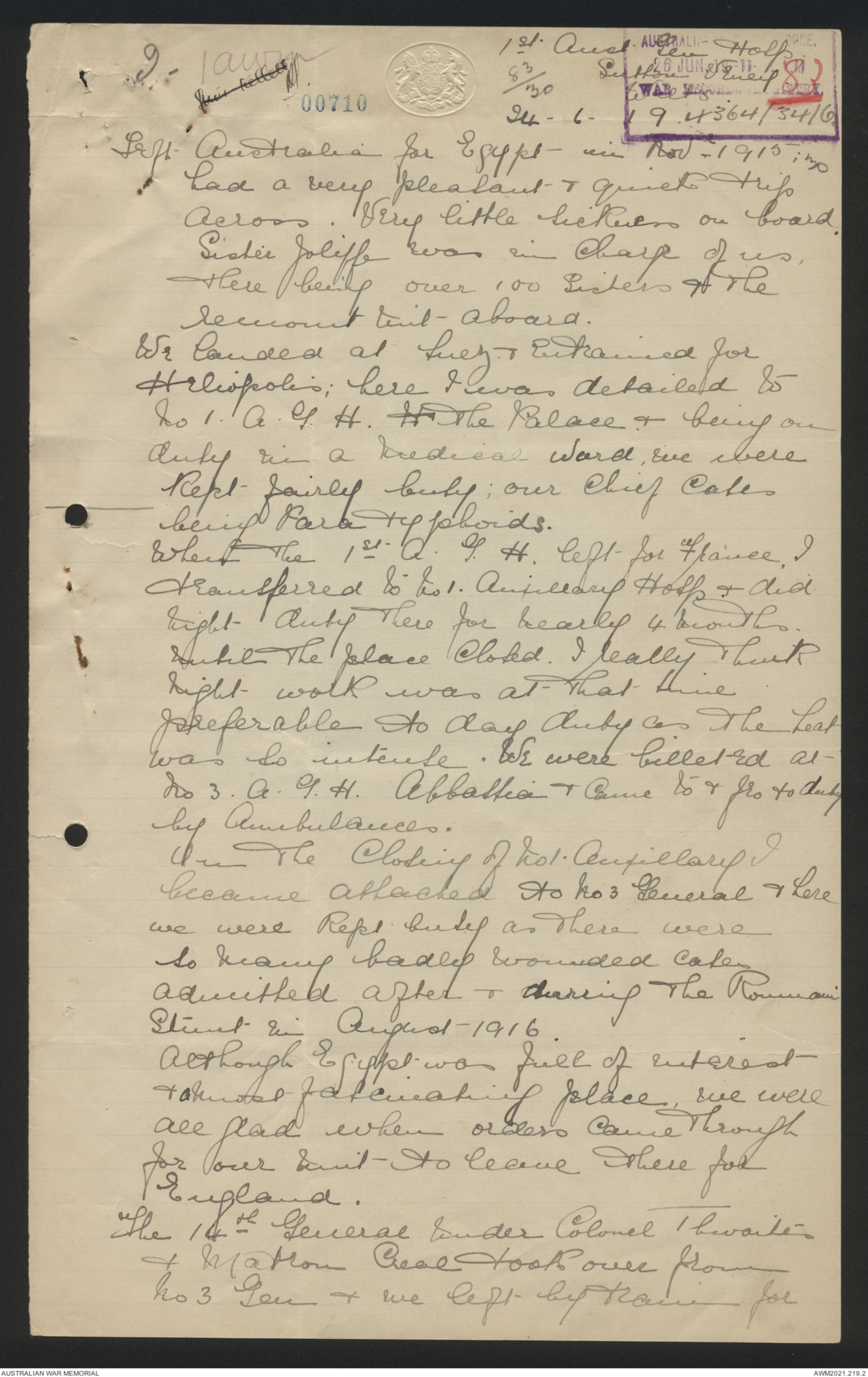
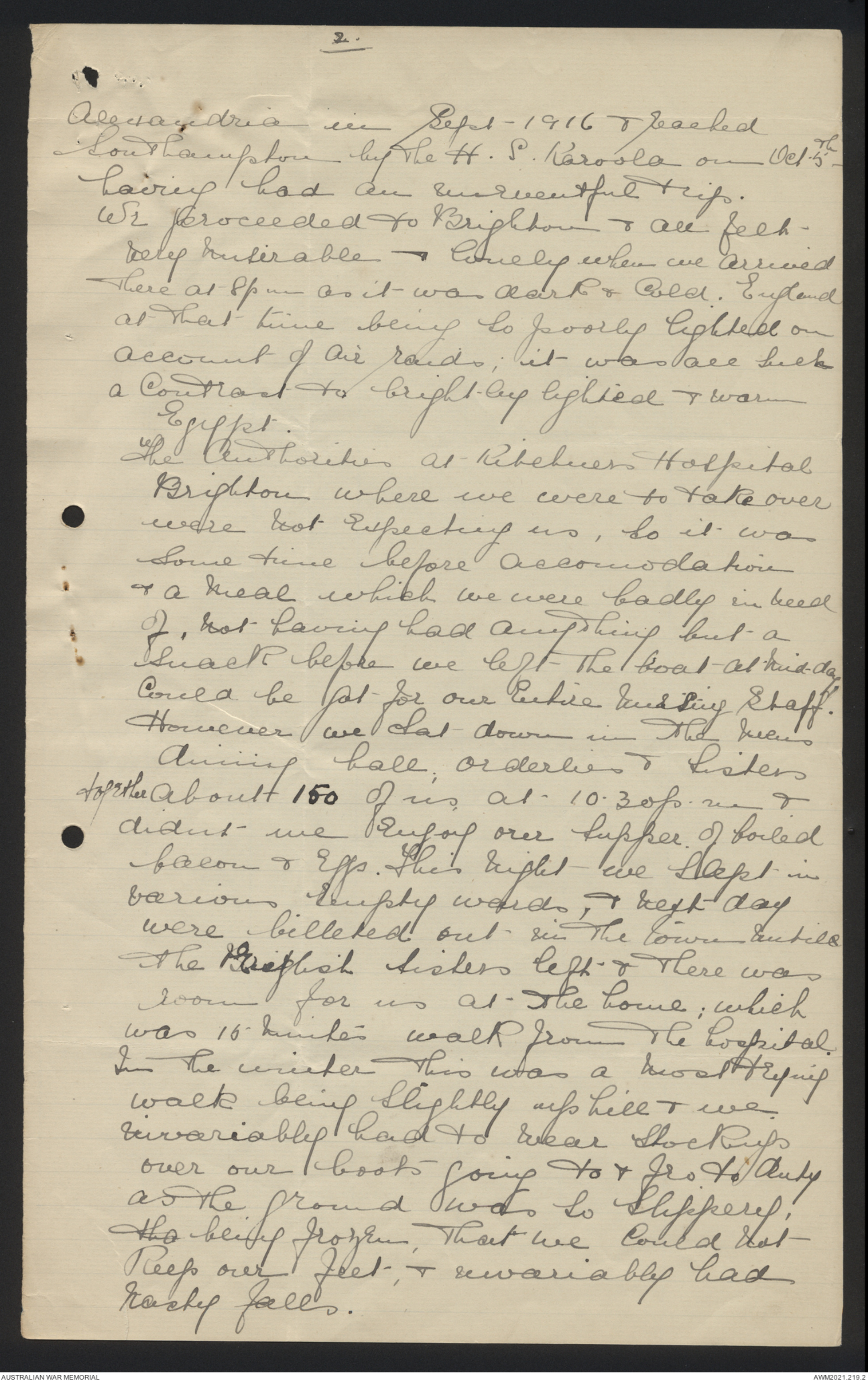
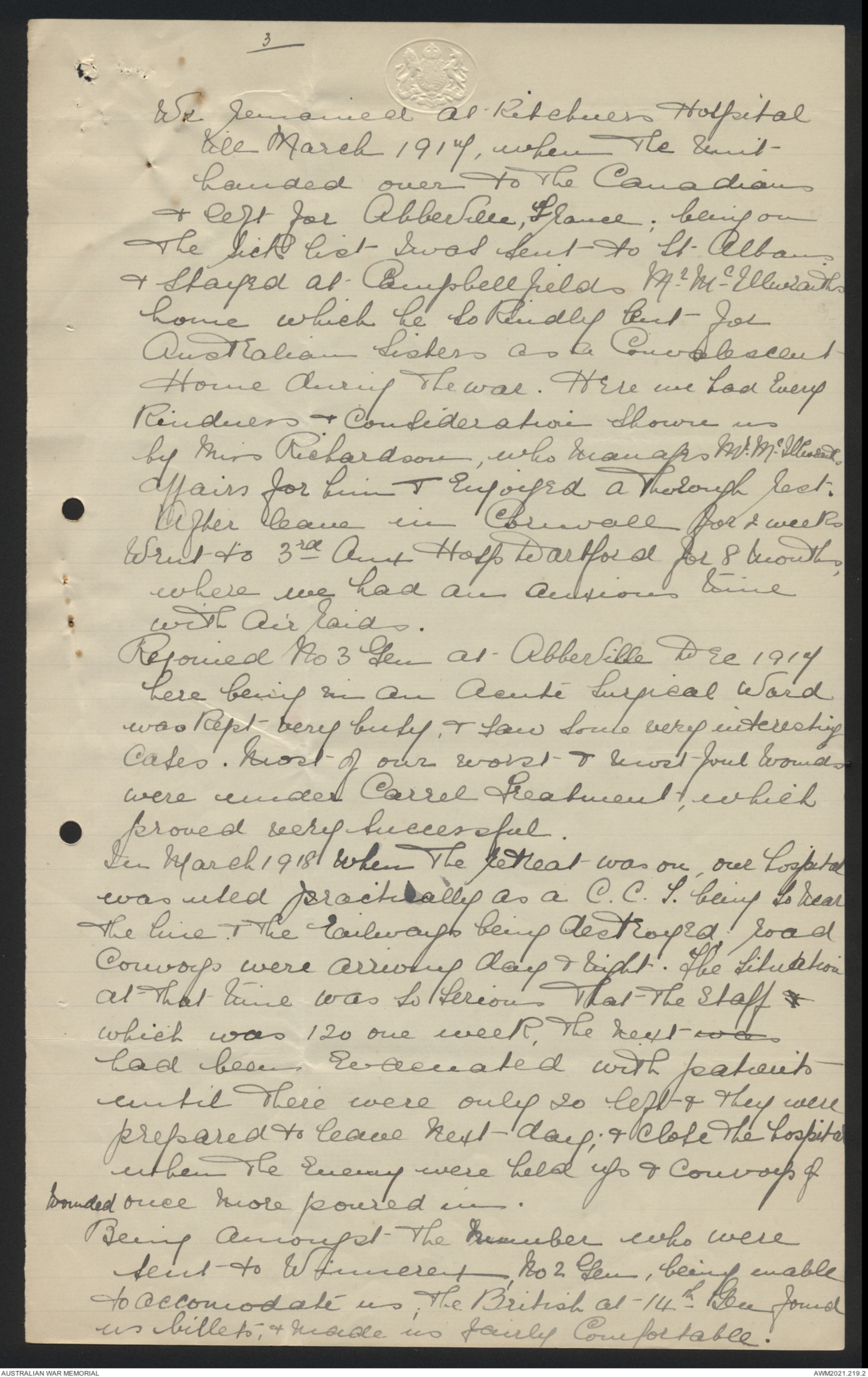
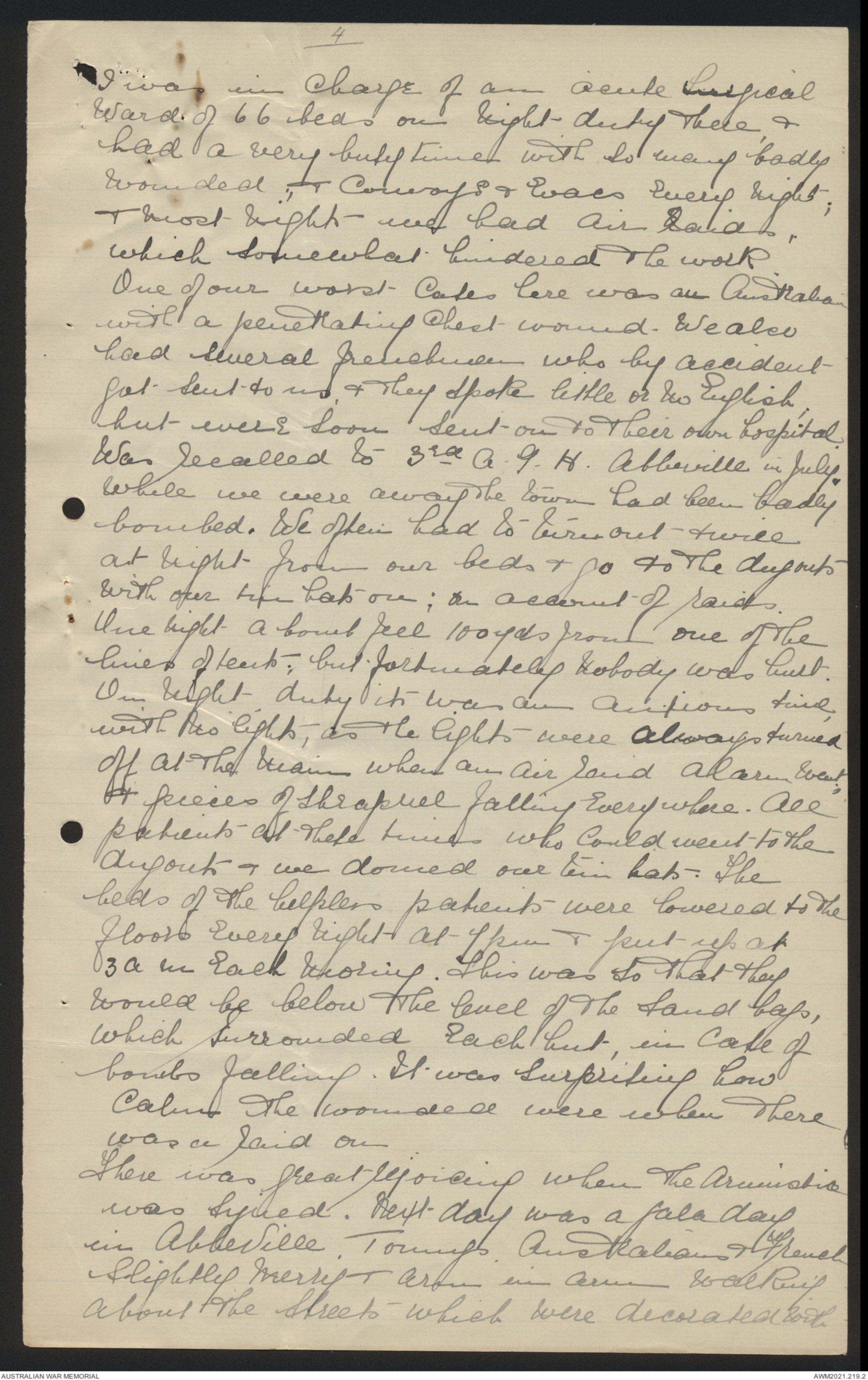
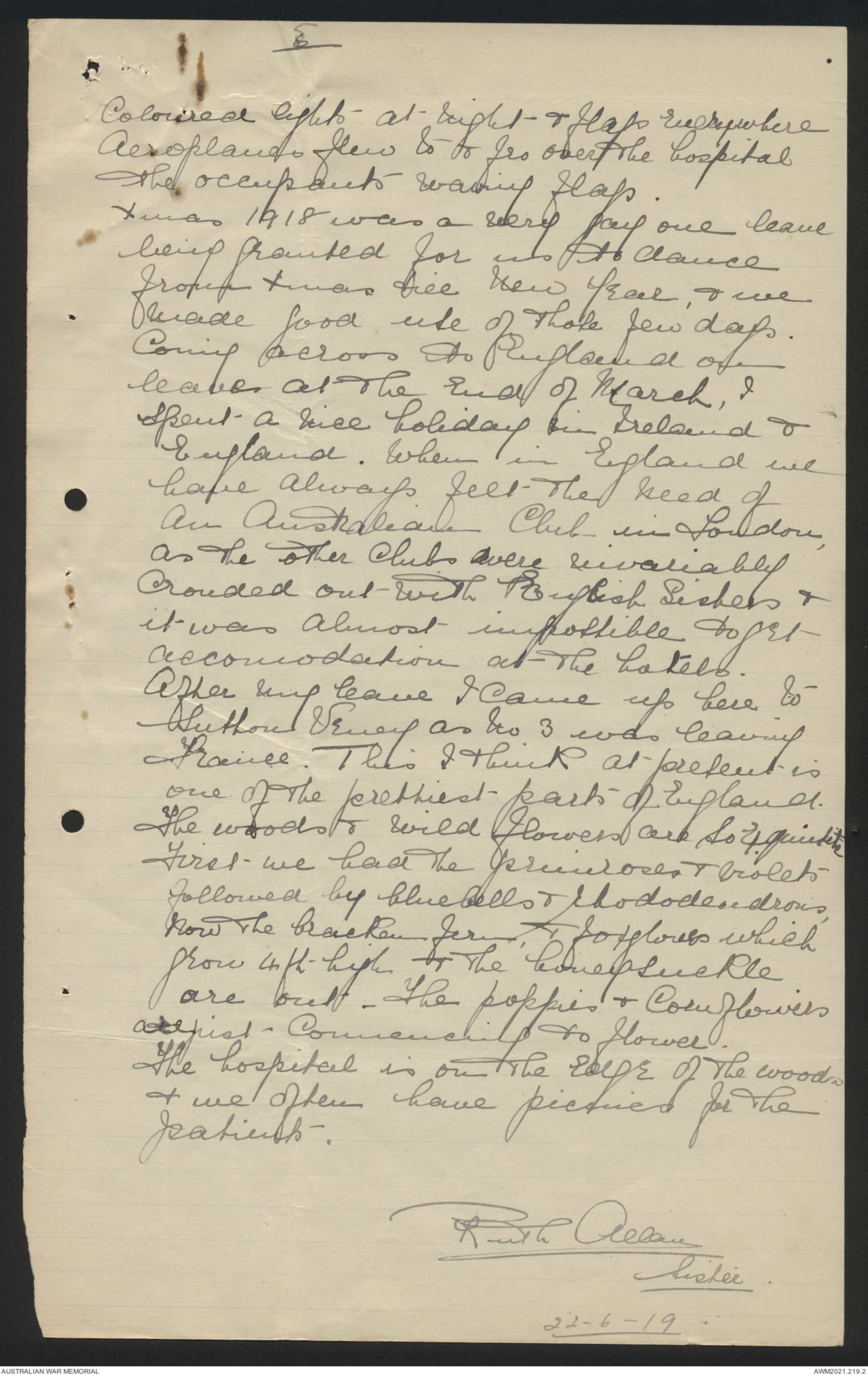
[*June Kellett*] 1st Aust Gen Hosp.
00710 Sutton Veney
83/30 Wilts
24.6.1943 64/34/6
Left Australia for Egypt in Nov 1915;
had a very pleasant & quiet trip
Across. Very little sickness on board.
Sister Joliffe was in Charge of us,
there being over 100 Sisters & the
Rececount Unit aboard.
We landed at Suez & Entrained for
Heliopolis; here I was detailed to
No 1. A.G.H. Dt the Palace. & being on
duty in a medical ward, we were
kept fairly busy ; our chief cases
being Para typhoids.
When the 1st A. G. H. left for France, I
transferred to No 1. Auxiliary Hosp & did
night duty there for nearly 4 months,
until the place closed. I really think
night work was at that time
preferable to day duty as the heat
was so intense. We were billeted at
No 3. A. G. H. Abbassia & came to & fro to duty
by Ambulances.
On the closing of No 1. Auxiliary I
became attached to No 3 General & here
we were kept busy as there were
so many badly wounded cases
admitted after & during the Rommani
Stunt in August - 1916.
Although Egypt was full of interest
& a most fascinating place, we were
all glad when orders came through
for out Unit to leave there for
England.
The 14th General under Colonel Thwaites
& Matron Creal took over from
No 3 Gen & we left by train for
2
Alexandria in Sept - 1916 & reached
Southampton by the H. S. Karoola on Oct 5th -
having had an uneventful trip.
We proceeded to Brighton & all felt
very miserable & lonely when we arrived.
there at 8pm as it was dark & cold. England
at that time being so poorly lighted on
account of Air raids; it was all such
a contrast to brightly lighted & warm
Egypt.
The Authorities at Kitcheners Hospital
Brighton where we were to take over
were not expecting us, so it was
some time before accommodation
& a meal which we were badly in need
of, not having had anything but a
snack before we left the boat at mid-day,
could be got for our Entire Nursing Staff.
However we sat down in the mens
dining hall; orderlies & Sisters
together about 150 of us, at 10.30 p.m. &
didn't we enjoy our supper of boiled
bacon & eggs. This night we slept in
various empty wards, & next day
were billeted out in the town until
the English Sisters left & there was
room for us at the house ; which
was 15 minutes walk from the hospital.
In the winter this was a most trying
walk being slightly up hill & we
invariably had to wear stockings
over our boots going to & fro to duty
as the ground was so slippery, tha being frozen, that we could not
keep our feet & invariably had
nasty falls.
3
We remained at Kitcheners Hospital
till March 1917, when the Unit
handed over to the Canadians
& left for Abbeville, France ; being on
the sick list I was sent to St Albans
& stayed at Campbellfields Mr McIllwraiths
home which he so kindly lent for
Australian sisters as a Convalescent
Home during the war. Here we had every
kindness & consideration shown us
by Mrs Richardson, who manages Mr McIllwraiths
affairs for him & enjoyed a thorough rest.
After leave in Cornwall for 2 weeks
went to 3rd Aust Hosp Dartford for 8 months,
where we had an anxious time
with Air raids.
Rejoined No 3 Gen at Abbeville Dec 1917
here being in an Acute Surgical Ward
was kept very busy, & saw some very interesting
cases. Most of our worst & most foul wounds
were under Carrel treatment, which
proved very successful.
In March 1918 when the retreat was on, our hospital
was used practically as a C.C.S. being so near
the line & the railways being destroyed, road
convoys were arriving day & night. The situation
at that time was so serious that the staff &
which was 120 one week, the next was
had been evacuated with patients
until there were only 20 left & they were
prepared to leave next day; & close the hospital
when the enemy were held up & convoys of
wounded once more poured in.
Being amongst the number who were
sent to Wimereux, No 2 Gen, being unable
to accommodate us, the British at 14th Gen found
us billets & made us fairly comfortable.
4
I was in charge of an acute surgical
ward of 66 beds on night duty there, &
had a very busy time with so many badly
wounded, & convoys & evacs every night;
& most nights we had air raids,
which somewhat hindered the work.
One of our worst cases here was an Australian
with a penetrating chest wound. We also
had several frenchmen who by accident
got sent to us, & they spoke little or no English,
but were soon sent on to their own hospital.
Was recalled to 3rd A. G. H. Abbeville in July.
While we were away the town had been badly
bombed. We often had to turn out twice
at night from our beds & go to the dugouts
with our tin hats on; on account of raids.
One night a bomb fell 100 yds from one of the
lines of tents; but fortunately nobody was hurt.
On night duty it was an anxious time,
with no lights, as the lights were always turned
off at the mains when an air raid alarm went
& pieces of shrapnel falling everywhere. All
patients at these times who could went to the
dugouts & we donned our tin hats. The
beds of the helpless patients were lowered to the
floor every night at 7pm & put up at
3 a m each morning. This was so that they
would be below the level of the sand bags,
which surrounded each hut, in case of
bombs falling. It was surprising how
calm the wounded were when there
was a raid on.
There was great rejoicing when the Armistice
was signed. Next day was a gala day
in Abbeville. Tommys, Australians & French
slightly merry & arm in arm walking
about the streets - which were decorated with
5
coloured lights at night & flags everywhere
Aeroplanes flew to & fro over the hospital
the occupants waving flags.
Xmas 1918 was a very gay one leave
being granted for us to dance
from Xmas till New Year, & we
made good use of those few days.
Coming across to England on
leave at the end of March, I
spent a nice holiday in Ireland &
England. When in England we
have always felt the need of
an Australian Club in London,
as the other clubs were invariably
crowded out with English Sisters &
it was almost impossible to get
accommodation at the hotels.
After my leave I came up here to
Sutton Veney as No 3 was leaving
France. This I think at present is
one of the prettiest parts of England.
The woods & wild flowers are so Exquisite
First - we had the primroses & violets
followed by bluebells & rhododendrons,
now the bracken ferns, & foxgloves which
grow 4ft high & the honeysuckle
are out. The poppies & Cornflowers
are just commencing to flower.
The hospital is on the edge of the woods
& we often have picnics for the
patients.
Ruth Allan
Sister
22-6-19
 Jacqueline Kennedy
Jacqueline KennedyThis transcription item is now locked to you for editing. To release the lock either Save your changes or Cancel.
This lock will be automatically released after 60 minutes of inactivity.